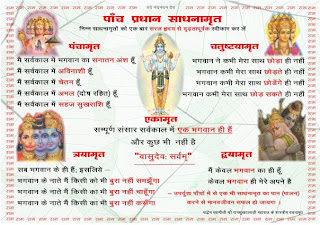Maagh Krishna Chaturdasi, Ravivar, Vikram Samvat 2068
The Ultimate Frontier of Spiritual Discipline
(continued)
This ego is a part of the Lower nature (apara prakriti). Earth, water, fire, air, space, mind, intellect and ego - of this the `ego" is the subtlest of them all. Even though this is subtlest of them all, then too it is a part of nature (prakruti). This lower nature is the thing that leads to bondage. Besides lower nature, the Self has no flaws whatsoever. The self is entirely flawless (free of faults) and is an "ansh" (part) of God. The fragment "ansh" of Nature, remains established in Nature and "ansh" of God remains established in God. However "jeev" (embodied soul) attracts the "ansh" (mind-intellect-senses) of Nature (Prakriti) towards itself, in other words, he regards them as his own –
Manashashthaaneendriyaani prakritisthaani karshati || (Gita 15/7)
It attracts (by assuming a relation with/ accepting as his own) the mind and the five senses, which are abiding/ established in nature. (Gita 15/7)
Nature (prakriti) remains honest, as it remains established in itself, but we by mistake become established in Nature. We assume the gross-subtle-causal body as our very own and we get bound. The activities performed by the gross body, the reflecting, philosophising done with the subtle body and the deep trance experienced by the causal body – these all are only in Nature (prakriti). I "the self" is apart from Nature - "gunaateetah sa uchyate" (Gita 14/25). We are visibly and evidentially, without doubt, only God's. Therefore an aspirant should want that he once, with a simple, straight-forward heard, with a firm conviction accept that I am only God's and only God is my very own. The aspirant only has to do that much work, there is no other work.
Acceptance does not take place twice, rather it takes place only once. In acceptance there is no "practice" (abhyaas). On getting married, the girl accepts herself as a wife, for this she does not need to "chant with the holy beads". Simply by acceptance, she becomes the husband's. Similarly, it is only by acceptance that an aspirant crosses the ocean of bliss. However, mostly this one time acceptance does not take place. In this the main reason seems to be - 1) Importance, emphasis and value of practice (abhyaas)
- 2) Attraction to pleasures and hoarding.
So far all the work that has been done, it has all been done through "practice" (abhyaas). Therefore it is ingrained in the inner-senses (antahkarana) that attainment of God will also be through practice (abhyaas). In reality, attainment of God is not through practice (abhyaas). With practice (abhyaas), a new thing is learned. In "abhyaas" one has to take the support of the inert (jada); however, attainment of Paramatma is not through the aid of "inert", rather it is through renouncing the inert. With the aid of "inert" worldly activities take place.
In realization (praapti) of Paramatma (God), there is nothing to be done whatsoever. However, due to having great insistence upon practice (abhyaas), on having a built in tendency to "practice" (abhyaas), an apirant asks, tell me, now what to do? I have understood this subject, now what is to be done next?
(to be continued.....)
From "Sant Samaagam" in Hindi by Swami Ramsukhdasji
If in doubt regarding the translation, please read the original Hindi message by Swamiji.
FOR MESSAGE IN HINDI PLEASE VISIT Date : 19th January, 2012 "SAADHAN KI CHARAM SEEMA"
